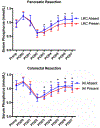Hypophosphatemia as a Predictor of Organ-Specific Complications Following Gastrointestinal Surgery: Analysis of 8034 Patients
- PMID: 29955938
- PMCID: PMC6310662
- DOI: 10.1007/s00268-018-4726-3
Hypophosphatemia as a Predictor of Organ-Specific Complications Following Gastrointestinal Surgery: Analysis of 8034 Patients
Erratum in
-
Correction to: Hypophosphatemia as a Predictor of Organ-Specific Complications Following Gastrointestinal Surgery: Analysis of 8034 Patients.World J Surg. 2019 Feb;43(2):395. doi: 10.1007/s00268-018-4845-x. World J Surg. 2019. PMID: 30406321
Abstract
Background: Organ-specific complications (OSC) remain serious potential sequela of gastrointestinal surgery. Hypophosphatemia correlates with poor outcomes and may be a harbinger of OSC after gastrointestinal surgery. Our goal was to describe and evaluate the relationship between postoperative phosphate levels and OSC.
Methods: Consecutive patients who underwent pancreatic, colorectal, or gastric resections were analyzed. OSC were defined as those resulting from the failure of at least one anastomosis performed during the primary resection, manifesting as an anastomotic leak, fistula, and/or intra-abdominal abscess. Postoperative serum phosphate levels and other recognized OSC risk factors were compared among patients who did and did not develop OSC.
Results: A total of 8034 patients who underwent pancreatic (n = 397), colorectal (n = 5808), or gastric (n = 1829) resections were included in the study. In each resection group, the majority of patients experienced hypophosphatemia postresection with the nadir on postoperative day (POD) 2, and the subgroups that developed OSC exhibited lower phosphate levels on POD3-7. On multivariate analysis, lower phosphate level on POD3 remained significantly associated with OSC following pancreatic resection [median (interquartile range) mmol/L, 0.65 (0.53-0.76) vs. 0.71 (0.61-0.84), p = 0.045] and colorectal resection [0.71 (0.61-0.87) vs. 0.77 (0.65-0.94), p = 0.006], and lower phosphate level on POD4 remained associated with OSC following gastric resection [0.87 (0.74-1.03) vs. 0.96 (0.81-1.13), p = 0.049].
Conclusion: This study identified a consistent trajectory of serum phosphate levels following 3 different gastrointestinal operations and association between early postoperative phosphate levels and OSC. Persistent lower phosphate levels should raise the level of concern for evolving postoperative leak and may lead to earlier radiographic evaluation and treatment.
Conflict of interest statement
Figures


Similar articles
-
Lower phosphate levels following pancreatectomy is associated with postoperative pancreatic fistula formation.HPB (Oxford). 2019 Jul;21(7):834-840. doi: 10.1016/j.hpb.2018.10.017. Epub 2018 Nov 29. HPB (Oxford). 2019. PMID: 30503649
-
Implications of Postpancreatectomy Hypophosphatemia.Am Surg. 2021 Jan;87(1):61-67. doi: 10.1177/0003134820949517. Epub 2020 Sep 13. Am Surg. 2021. PMID: 32924538
-
Hypophosphatemia after Hepatectomy or Pancreatectomy: Role of the Nicotinamide Phosphoribosyltransferase.J Am Coll Surg. 2017 Oct;225(4):488-497e2. doi: 10.1016/j.jamcollsurg.2017.06.012. Epub 2017 Jul 6. J Am Coll Surg. 2017. PMID: 28690207 Free PMC article.
-
Postoperative non-steroidal anti-inflammatory drugs and colorectal anastomotic leakage. NSAIDs and anastomotic leakage.Dan Med J. 2012 Mar;59(3):B4420. Dan Med J. 2012. PMID: 22381097 Review.
-
Is a drain necessary after anterior resection of the rectum? A systematic review and meta-analysis.Int J Colorectal Dis. 2019 Jun;34(6):973-981. doi: 10.1007/s00384-019-03276-4. Epub 2019 Apr 25. Int J Colorectal Dis. 2019. PMID: 31025093
Cited by
-
Postoperative Hypophosphatemia as a Prognostic Factor for Postoperative Pancreatic Fistula: A Systematic Review.Medicina (Kaunas). 2023 Jan 31;59(2):274. doi: 10.3390/medicina59020274. Medicina (Kaunas). 2023. PMID: 36837475 Free PMC article.
-
Membrane lipid renovation in Pseudomonas aeruginosa - implications for phage therapy?Environ Microbiol. 2022 Oct;24(10):4533-4546. doi: 10.1111/1462-2920.16136. Epub 2022 Aug 14. Environ Microbiol. 2022. PMID: 35837865 Free PMC article. Review.
-
Postoperative hypophosphatemia as a predictor of complications after pancreaticoduodenectomy: Insights from a tertiary gastrointestinal surgery center.Medicine (Baltimore). 2025 Aug 1;104(31):e43660. doi: 10.1097/MD.0000000000043660. Medicine (Baltimore). 2025. PMID: 40760585 Free PMC article.
-
Evaluating the Risk of Hypophosphatemia with Ferric Carboxymaltose and the Recommended Approaches for Management: A Consensus Statement.J Clin Med. 2025 Jul 9;14(14):4861. doi: 10.3390/jcm14144861. J Clin Med. 2025. PMID: 40725553 Free PMC article. Review.
-
Earthing as a Supportive Therapy for Post-Spinal Surgery Recovery.J Clin Med. 2025 May 29;14(11):3844. doi: 10.3390/jcm14113844. J Clin Med. 2025. PMID: 40507606 Free PMC article.
References
-
- Larsson L, Rebel K, Sorbo B (1983) Severe hypophosphatemia--a hospital survey. Acta medica Scandinavica 214:221–223 - PubMed
-
- King AL, Sica DA, Miller G, et al. (1987) Severe hypophosphatemia in a general hospital population. Southern medical journal 80:831–835 - PubMed
-
- Zazzo JF, Troche G, Ruel P, et al. (1995) High incidence of hypophosphatemia in surgical intensive care patients: efficacy of phosphorus therapy on myocardial function. Intensive care medicine 21:826–831 - PubMed
-
- Marik PE, Bedigian MK (1996) Refeeding hypophosphatemia in critically ill patients in an intensive care unit. A prospective study. Arch Surg 131:1043–1047 - PubMed
-
- Berger MM, Rothen C, Cavadini C, et al. (1997) Exudative mineral losses after serious burns: a clue to the alterations of magnesium and phosphate metabolism. The American journal of clinical nutrition 65:1473–1481 - PubMed
MeSH terms
Substances
Grants and funding
LinkOut - more resources
Full Text Sources
Other Literature Sources
Medical

